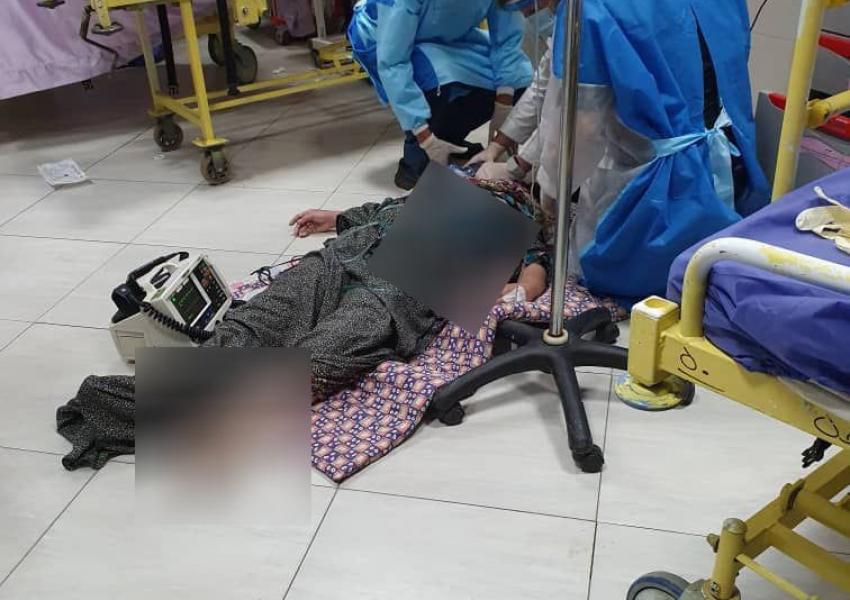
US-Based Group Urges Un-Freezing Iranian Money To Fund Covid Vaccines
The Maryland-based National Union for Democracy in Iran (NUFDI) in a letter to the United States President Joe Biden Friday urged "immediate executive action" to use Iranian money frozen in the US to pay for Covid-19 vaccines to be sent to Iran. The US Treasury in 2015 estimated that around $2 billion in Iranian state funds were frozen in the US.
Since 2018, the US has imposed third-party sanctions that threaten punitive action against any entity dealing with the Iranian financial sector. While the US insists medicines and humanitarian aid is exempt from sanctions, and the Trump administration offered assistance to Iran to fight Covid, Human Rights Watch has argued the sanctions impede Iran’s ability to access medicines. Others have argued that Iran regularly imports medicines without any impediment.
"While the world struggles with Covid-19, the Iranian people are struggling under a regime condemning them to death by banning the American-made vaccines which could save their lives," NUFDI wrote in its letter to Biden referring to a ban announced in January by Iran’s Supreme Leader Ali Khamenei on US- and British-made vaccines.
NUFDI, which opposed the unfreezing of Iranian assets by the Obama administration, characterizes itself as a "nonpartisan, non-profit organization of Iranian-Americans raising awareness on the freedom movement in Iran.”
Directly available
NUFDI said that vaccines funded by Iran's frozen assets should be made available to Iranians directly by the World Health Organization or “other relevant international entities” instead of by the Iranian government. In fact, the WHO is a supervisory, advisory organization and as a United Nations body operates in accordance with the UN Charter.
Since June, daily Covid cases in Iran have quadrupled to around 40,000 with only 3.8 percent, or 3.15 million, fully vaccinated according to figures from John Hopkins University. Currently all major cities are designated as 'red zones.' The government announced a five-day national lockdown on Saturday starting Monday with movement between cities restricted from Sunday afternoon.
In recent weeks several officials, including outgoing Foreign Minister Mohammad Javad Zarif and the head of Tehran Coronavirus Combat Taskforce Alireza Zali, have criticized the health ministry for delay in securing vaccines. In an interview with Modara website Saturday, reformist politician and professor of pediatrics Dr Mostafa Moeen suggested authorities might have delayed vaccine procurement to prevent competition for domestic companies and vaccines.
Medical mafia
Moeen urged the judiciary to investigate possible involvement of a “medicine and medical equipment mafia” in profiteering. Food and Drug Administration Head Mohammad Shanesaz on June 23 confirmed that CovIran Barakat, the only homegrown vaccine authorized for use, cost around $9, compared to AstraZeneca, which is sold at $4. CovIran Barakat is produced by Shifa Pharmed, a subsidiary of Barakat Pharmaceutical, which is owned by the Execution of Imam Khomeini’s Order (EIKO), a charitable-cum-business organization answerable to the supreme leader.
On July 2 Mohammad Mokhber, a senior official at EIKO and subsequently appointed first vice-president by President Ebrahim Raisi (Raeesi), said that by the end of September 50 million doses would be produced. Despite such claims, the Food and Drug Administration Spokesman Kianoush Jahanpur said recently that 1.1 million doses had been used in the vaccination program, out of a total put at 16.2 million by John Hopkins. Around half of the vaccines have come from China.
To date, Iran has recorded nearly 100,000 deaths. An official of Imam Reza Hospital of Mashhad, Alireza Sedaghat, Friday said the numbers announced should be tripled based on the burials in cemeteries in the city, where official figures have now 80 daily Covid deaths.









